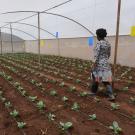Rapid urbanization in Sub-Saharan Africa has resulted in an increase in demand for food, and fruit and vegetable consumption in the region remains 22-82% below the intake value threshold of 400 g/day recommended by the World Health Organization and UN Food and Agricultural Organization. Smallholder vegetable growers are often poor and lack access to inputs for improved germplasm, pest and disease control tools, and improved crop production techniques. Vegetable farms are routinely devastated by pests and extended drought conditions.
This project team, led first by Mathieu Ngouajio and later by Vance Baird of Michigan State University, worked to harness the use of nets as an alternative pest management techniques and micro-climate modification, along with grower education and training to improve small-scale vegetable production in East and West Africa. A participatory approach was used to demonstrate efficacy of 1) Eco-Friendly Nets, an insect barrier netting (either treated or not with insecticides) produced by A to Z Textile Mills that can protect vegetables against pests and associated viral diseases and 2) floating row covers at improving crop micro-climate and enhancing yield and produce quality. The team also assessed and addressed farmer’s perception of the nets in order to increase adoption and use of the technology.

